#like ten months ago
Explore tagged Tumblr posts
Text
shoutout to the time i was making out with this guy and then we stopped making out and i was like “hey do you want to hear me explain this really convoluted series of concept albums that has mass amounts of lore” and for SOME REASON he wanted to listen me talk about that so i proceeded to explain every paul shapera album through secret series (because that was all i had listened to at that point) PLUS the extended postie lore. i don’t know how he was still attracted to me after that.
#this happened almost a year ago btw.#like ten months ago#my shaperaverse hyperfixation went dormant from like august 2021-may 2024 but i was always there. lurking in the background.#to this day it was my longest lasting hyperfixation. it lasted basically a full year.#so it sticks in my brain at all times#plus it’s just a weird thing to talk about out of context which i like lol#shaperaverse#new albion
22 notes
·
View notes
Text



Songs from The Tortured Poets Department as Penguin Modern Classics ✨
#hellieedits#i started these like six months ago loooool#thought i'd get them finished this morning but they went from twelve books to twenty#which added an extra like ten hours apparently💀#the tortured poets department#ttpd#taylor swift#taylor swift edit#tswiftedit#penguin books#book covers#graphic design#edit#book design
1K notes
·
View notes
Text
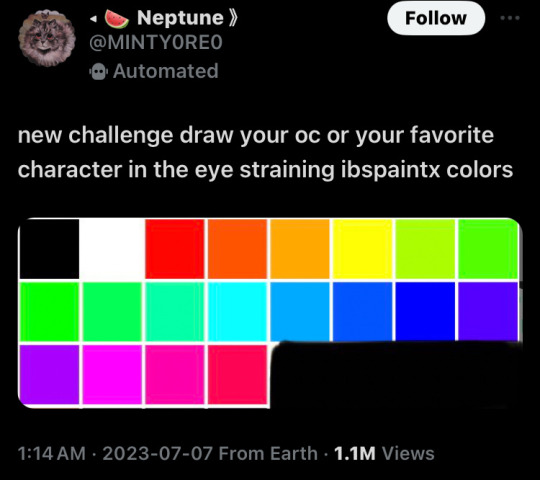
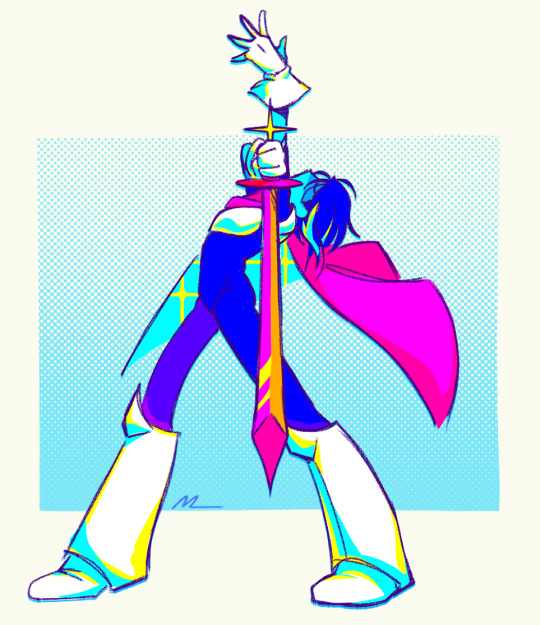
did this again bc i can :3c
#cw: eyestrain#eyestrain#is this a redraw? idk man#first one is from like ten months ago#time flies damn#deltarune#undertale#utdr#deltarune fanart#kris dreemurr#kris deltarune#art#fanart#doodle
2K notes
·
View notes
Text
Marvel's Squirrel Girl: The Unbeatable Radio Show! | All of Erik Lehnsherr's Call-In's
Episodes featured: The Fate of My Universe The Sinister Six Are No More Who Would Win In A Fight? Unbeatable
Full Podcast Playlist (Spotify)
Credits below:
Written by: Ryan North
Directed by: Giovanna Sardelli
Voice Cast: Milana Vayntrub - Squirrel Girl/Doreen Green Crystal Lucas Perry - Nancy Whitehead Leo Sheng - Koi Boi/Ken Shiga Davied Morales - Chipmunk Hunk/Tomas Lara-Perez Erica Schroeder - Tippy T. Squirrel Rob Nagle - Erik Lehnsherr
Key Art: "Squirrel Girl Infinity Comic (2022)" by Derek Charm - Doreen, Nancy, Ken, Tomas, Tippy "Magneto (2023)" by Todd Nauck - Erik
#marvel#x-men#squirrel girl#magneto#cherik#i'm not tagging everyone im too drunkf rothat#i dont have a tag for vids DAMIt> this gon be my only oen#snap chats#HERE IT ISS !!!!! FINALLY !!! LIKE FOUR MONTHS IN THE MAKING <- was just too lazy to do it#i thought id focus on work all day but OOPSIEE !!!!!!!!! i was too inspired#legally had to use nauck's art that's another goat of mine ... i love his style sm its so cute and expressive and bold...#theres small things in this that bother me but whatever ive literally done this all day#im posting it and moving on#im forcing you to reblog this. DO IT#i kept giggling while makign this cause mags is so funny ....#im still crying at him being like 'yeah i said i was never going back AND I MEANT IT'#also doreen a cherik shipper ...... queen behavior i always knew it#PLEASE ENJOY !!! IM BEGGING YOU !!!! im pinning this to my blog idc this took forever#also his call ins are genuinely so funny i love him so much. my silly peepaw.....#take a shot every time he says 'charles' tho i swear to god#i was actually going to do that tongiht but Legit the amount of whiskey i had was not enough HE SAYS CHARLES SO MUCH#im ending the tags here so i dont go on a rant about how in love mags is with charles. enoug..#NOT EVEN A PODCAST SERRIES IS SAFE FROM CHERIK IM CRYINGGGGGG#they will makethemselves a probelm to EVERYONE#'please dont be evil' he'll be worse. he'll be needy jLVKAJ ERIK IS SO NEEDY IM CRYING#ok i think thats all i have to sya . im a lil tipsy so i cant think right#WAIR I REMEMBER I WANTED TO CRY ABOUT ERIKS STPID 'SWEETOOTH' JOKE I HATE HIM !!!! <- deeply in love with him#'snap you said you were drinking like ten minutes ago are you fr' dont look at me. GOOD NIGHT !!!
528 notes
·
View notes
Text
patience being tested. being forced by a bizarre unfortunate situation to adhere to university requirement technicality by taking this simple basic elementary "introduction to environmental history" class.
this class is from facilitators/program which do, like, "history of the American frontier" or "history of fishing and hunting" and still basically subscribe to that old-school twentieth-century idealization and celebration of characters like Teddy Roosevelt and reverence for a mythical arc-of-history-bent-towards-justice narrative of the often-clumsy but ultimately-benevolent US federal government and its mission to "save nature" through the miracle of "sustained yield," while heroic federal land management agencies and "heritage" institutions lead to way, staffed by exceptional individuals (appeals to nostalgia for the frontier and an imagined landscape of the American West; ego-stroking appeals to flattering self-image that center the environmentalist or academic). where they invoke, y'know, ideas like "ecology is important because don't you enjoy cross-country skiing in The Woods with your niece and nephew? don't you like hunting and fishing?" which makes it feel like a time capsule of appeals and discourses from the 1970s. and it invokes concept of "untouched wilderness" (while eliding scale of historical Indigenous environmental relationships and current ongoing colonial violence/extractivism). but just ever-so-slightly updated with a little bit of chic twenty-first-century flair like a superficial land acknowledgement or a reference to "labor histories" or "history from below," which is extra aggravating when the old ideologies/institutions are still in power but they're muddying the water and diluting the language/frameworks (it's been strange, watching words like "multispecies" and "Anthropocene" over the years slowly but surely show-up on the posters, fliers, course descriptions, by now even appearing adjacent to the agri-business and resource extraction feeder programs, like a recuperation or appropriation.) even from a humanities angle, it's still, they're talking at me like "You probably didn't know this, but environmental history is actually pretty entangled with political and social events. In fact, we can synthesize sources and glean environmental info from wacky places like workers' rolls in factories, ship's logs, and poetry from the era." and i'm nodding like YEP.
the first homework assignment is respond to this: "Define and describe 'the Anthropocene'. Do you think 'the Anthropocene' is a useful concept? Why or why not?" Respond in 300 words.
so for fun, right now in class, going to see how fast i can pull up discussion of Anthropocene-as-concept solely from my old posts on this microblogging site.
---
ok, found some
---
I think that the danger in any universal narrative or epoch or principle is exactly that it can itself become a colonizing force. [...] I’m suspicious of the Anthropocene as concept for the very reason that it subsumes so many peoples, nations, histories, geographies, political orders. For that reason, I think ideas like the Anthropocene can be a useful short-hand for a cluster of tangible things going on with the Earth at the moment, but we have to be very careful about how fluid and dynamic ideas become concretized into hegemonic principles in the hands of researchers, policymakers, and politicians. There’s so much diversity in histories and experiences and environmental realities even between relatively linked geographies here in Canada [...]. Imagine what happens when we try to do that on a global scale - and a lot of euro-western Anthropocene, climate change and resilience research risks doing that - eliding local specificities and appropriating knowledge to serve a broader euro-western narrative without attending to the inherent colonial and imperial realities of science and policy processes, or even attending to the ways that colonial capitalist expansion has created these environmental crises to begin with. While we, as a collective humanity, are struggling with the realities of the Anthropocene, it is dangerous to erase the specific histories, power-relations, political orders that created the crisis to begin with. So, I’m glad that a robust critique of the Anthropocene as a concept is emerging.
Text by: Words of Zoe Todd, as interviewed and transcribed by Caroline Picard. “The Future is Elastic (But it Depends): An Interview with Zoe Todd.” 23 August 2016.
---
---
---
The Great Acceleration is the latest in a series of human-driven planetary changes that constitute what a rising chorus of scientists, social scientists, and humanists have labeled the Anthropocene - a new Age of Humans. [...] But what the Anthropocene label masks, and what the litany of graphs documenting the Great Acceleration hide, is a history of racial oppression and violence, along with wealth inequality, that has built and sustained engines of economic growth and consumption over the last four centuries. [...] The plantation, Sidney Mintz long ago observed, was a “synthesis of field and factory,” an agro-industrial system of enterprise [...]. Plantation legacies, along with accompanying strategies of survival and resistance, dwell in the racialized geographies of the United States’ and Brazil’s prison systems. They surface in the inequitable toxic burdens experienced by impoverished communities of color in places like Cancer Alley, an industrial corridor of petrochemical plants running along the Mississippi River from New Orleans to Baton Rouge, where cotton was once king. And they appear in patterns of foreign direct investment and debt servitude that structure many land deals in the Caribbean, Brazil, and sub-Saharan Africa [...]. [C]limatologists and global change scientists from the University of London, propose instead 1610 as a date for the golden spike of the Anthropocene. The date marked a detectable global dip in carbon dioxide concentrations, precipitated, they argue, by the death of nearly 50 million indigenous human inhabitants [...]. The degradation of soils in the tobacco and cotton-growing regions in the American South, or in the sugarcane growing fields of many Caribbean islands, for example, was a consequence of an economic and social system that inflicted violence upon the land and the people enslaved to work it. Such violent histories are not so readily evident in genealogies that date the Anthropocene’s emergence to the Neolithic Revolution 12,000 years ago, the onset of Europe’s industrial revolution circa 1800, or the Trinity nuclear test of 1945. Sugarcane plantations were already prevalent throughout the Mediterranean basin during the late middle ages. But it was during the early modern era, and specifically in the Caribbean, where the intersection of emerging proto-capitalist economic models based on migratory forced labor (first indentured servitude, and later slavery), intensive land usage, globalized commerce, and colonial regimes sustained on the basis of relentless racialized violence, gave rise to the transformative models of plantations that reshaped the lives and livelihoods of human and non-human beings on a planetary scale. [...] We might, following the lead of science studies scholar Donna Haraway and anthropologist Anna Tsing, more aptly designate this era the Plantationocene. [...] It is also an invitation to see, in the words of geographer Laura Pulido, “the Anthropocene as a racial process,” one that has and will continue to produce “racially uneven vulnerability and death." [...] And how have such material transformations sustained global flows of knowledge and capital that continue to reproduce the plantation in enduring ways?
Text by: Sophie Sapp Moore, Monique Allewaert, Pablo F. Gomez, and Gregg Mitman. "Plantation Legacies." Edge Effects. 22 January 2019. Updated 15 May 2021. [Bold emphasis added by me.]
---
---
---
Geologists and other scientists will fight over [the definition of the beginning start-date of the Anthropocene] in scientific language, seeking traces of carbon dioxide that index the worst offenses of European empire which rent and violated the flesh, bodies, and governance structures of Indigenous and other sovereign peoples in the name of gold, lumber, trade, land, and power. [...] The stories we tell about the origins of the Anthropocene implicate how we understand the relations we have with our surrounds. In other words, the naming of the Anthropocene epoch and its start date have implications not just for how we understand the world, but this understanding will have material consequences, consequences that affect body and land.
Text by: Heather Davis and Zoe Todd. On the Importance of a Date, or Decolonizing the Anthropocene. ACME An International Journal for Critical Geographies. December 2017. [Bold emphasis added by me.]
---
---
---
From Aime and Suzanne Cesaire, C. L. R. James, Claudia Jones, Eduoard Glissant, through Sylvia Wynter, Christina Sharpe, and so many others, critical anticolonial and race theory has been written from the specific histories that marked the Black Atlantic. [...] Glissant also reminds us, secondly, of how cunning the absorptive powers of [...] liberal capitalism are - how quickly specific relations are remade as relations-erasing universal abstractions. [...] This absorptive, relations-erasing universalism is especially apparent in some contemporary discourses of […] liberalism and climate collapse - what some call the Anthropocene - especially those that anchor the crisis in a general Human calamity which, as Sylvia Wynter has noted, is merely the name of an overdetermined and specific [White] European man. […] [T]he condition of creating this new common European world was the destruction of a multitude of existing black and brown worlds. The tsunami of colonialism was not seen as affecting humanity, but [...] these specific people. They were specific - what happened to them may have been necessary, regrettable, intentional, accidental - but it is always them. It is only when these ancestral histories became present for some, for those who had long benefitted from the dispossession [...], that suddenly the problem is all of us, as human catastrophe.
Text by: Elizabeth Povinelli. “The Ancestral Present of Oceanic Illusions: Connected and Differentiated in Late Toxic Liberalism.” e-flux Journal Issue #112. October 2020.
---
The narrative arc [of White "liberal humanism"] [...] is often told as a kind of European coming-of-age story. […] The Anthropocene discourse follows the same coming-of-age [...] script, searching for a material origin story that would explain the newly identified trajectory of the Anthropos […]. Sylvia Wynter, W.E.B. DuBois, and Achille Mbembe all showed how that genealogy of [White subjecthood] was [...] articulated through sixteenth- through nineteenth-century [historiographies and discourses] in the context of colonialism, [...] as well as forming the material praxis of their rearrangement (through mining, ecological rearrangements and extractions, and forms of geologic displacements such as plantations, dams, fertilizers, crops, and introduction of “alien” animals). […] As Wynter (2000) commented, “The degradation of concrete humans, that was/is the price of empire, of the kind of [Eurocentric epistemology] that underlies it” (154).
Text by: Kathryn Yusoff. “The Inhumanities.” Annals of the American Association of Geographers, Volume 11, Issue 3. November 2020.
---
---
---
As Yarimar Bonilla suggests in regard to post-Irma-and-Maria Puerto Rico, “vulnerability is not simply a product of natural conditions; it is a political state and a colonial condition.” Many in the Caribbean therefore speak about the coloniality of disaster, and the unnaturalness of these “natural” disasters [...]. Others describe this temporality by shifting [...] toward an idea of the Plantationocene [...]. As Moore and her colleagues write, “Plantation worlds, both past and present, offer a powerful reminder that environmental problems cannot be decoupled from histories of colonialism, capitalism, and racism that have made some human beings more vulnerable [...].” [W]e see that contemporary uneven socioecologies associated with the rise of the industrial world ["the Anthropocene"] are based [...] also on the racialized denial and foreshortening of life for the sacrificial majority of black, brown, and Indigenous people and their relegation to the “sacrifice zones” of extractive industry. [...] [A]ny appropriate response to the contemporary climate emergency must first appreciate its foundations in the past history of the violent, coercive, transatlantic system of plantation slavery; in the present global uneven development, antiblackness, and border regimes that shape human vulnerability [...] that continues to influence who has access to resources, safety, and preferable ecologies [...] and who will be relegated to the “plantation archipelagoes” (as Sylvia Wynter called them) [...].
Text by: Mimi Sheller. “Thinking Beyond Coloniality: Toward Radical Caribbean Futures.” Small Axe (2021), 25 (2 (65)), pages 169-170. Published 1 July 2021. [Bold emphasis added by me.]
---
---
---
Indigenous genocide and removal from land and enslavement are prerequisites for power becoming operationalized in premodernity [...]; it was/is a means to operationalize extraction (therefore race should be considered as foundational rather than as periphery to the production of those structures and of global space). [...] Wynter suggests that we […] consider 1452 as the beginning of the New World, as African slaves are put to work on the first plantations on the Portuguese island of Madeira, initiating the “sugar-slave” complex - a massive replantation of ecologies and forced relocation of people […]. Wynter argues that the invention of the figure of Man in 1492 as the Portuguese [and Spanish] travel to the Americas instigates at the same time “a refiguring of humanness” in the idea of race. [...] The natal moment of the 1800 Industrial Revolution, […] [apparently] locates Anthropocene origination in […] the "new" metabolisms of technology and matter enabled by the combination of fossil fuels, new engines, and the world as market. […] The racialization of epistemologies of life and nonlife is important to note here […]. While [this industrialization in the nineteenth century] […] undoubtedly transformed the atmosphere with […] coal, the creation of another kind of weather had already established its salient forms in the mine and on the plantation. Paying attention to the prehistory of capital and its bodily labor, both within coal cultures and on plantations that literally put “sugar in the bowl” (as Nina Simone sings) […]. The new modes of material accumulation and production in the Industrial Revolution are relational to and dependent on their preproductive forms in slavery […]. In 1833, Parliament finally abolished slavery in the British Caribbean, and the taxpayer payout of £20 million in “compensation” [paid by the government to slave owners for their lost "property"] built the material, geophysical (railways, mines, factories), and imperial infrastructures of Britain and its colonial enterprises and empire. [...] A significant proportion of funds were invested in the railway system connecting London and Birmingham (home of cotton production and […] manufacturing for plantations), Cambridge and Oxford, and Wales and the Midlands (for coal). Insurance companies flourished [...]. The slave-sugar-coal nexus both substantially enriched Britain and made it possible for it to transition into a colonial industrialized power […]. The slave trade […] fashioned the economic conditions (and institutions, such as the insurance and finance industries) for industrialization.
Text by: Kathryn Yusoff. "White Utopia/Black Inferno: Life on a Geologic Spike". e-flux Journal Issue #97. February 2019. [Bold emphasis added by me.]
#sorry for being mean#instructor makes podcasts about cowboys HELP ME#and he recently won a New Business award for his startup magazine covering Democrat party politics in local area HELP#so hes constantly performing this like dance between new hip beerfest winebar coolness and oldfashioned masculinity#but hes in charge of the certificate program so i have to just shut up and keep my head down for approximately one year#his email address is almost identical to mine and invokes enviro history terms but i made mine long before when i was ten years old#so i could log in to fieldherpforum dot com to talk about enviro history of distribution range changes in local reptiles and amphibians#sir if you read my blog then i apologize ive had a long year#and i cant do anything to escape i am disabled i am constantly sick im working fulltime i have NO family i have NO resources#i took all of this schools graduate level enviro history courses and seminars years ago and ran the geography and enviro hist club#but then left in final semester because sudden hospitalization and crippled and disabled which led to homelessness#which means that as far as any profession or school is concerned im nobody im a retail employee#i was doing conference paper revisions while sleeping on concrete vomiting walking around on my cane to find outdoor wifi#and im not kidding the MONTH i got back into a house and was like ok going back to finish the semester the school had#put my whole degree program and department in moratorium from lack of funding#and so required starting some stuff from scratch and now feel like a hostage with debt or worsening health that could pounce any moment#to even get back in current program i was working sixteen hours a day to pay old library fines and had to delicately back out of workplace#where manager was straight up violently physically abusive to her vulnerable employees and threatened retaliation#like an emotional torturer the likes of which i thought existed only in cartoons#and the week i filed for student aid a massive storm had knocked out electricity for days and i was clearing fallen tree debris#and then sitting in the dark in my room between job shifts no music no phone no food with my fingers crossed and i consider it a miracle#sorry dont mean to dramatize or draw attention to myself#so actually im happy you and i are alive
134 notes
·
View notes
Text

witchywoman
#dragon age#morrigan#dao#i first played dao this month like ten years ago. who can believe#also i never draw on my tablet so this looks like pure shite lel#q
2K notes
·
View notes
Text

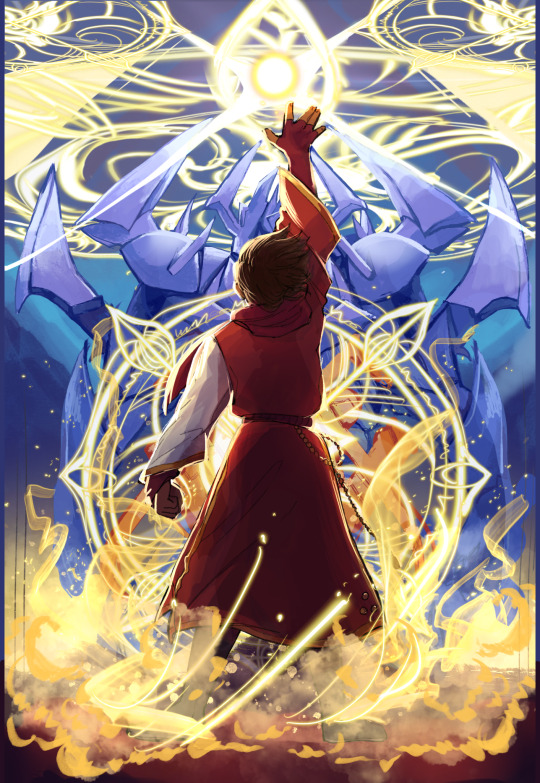
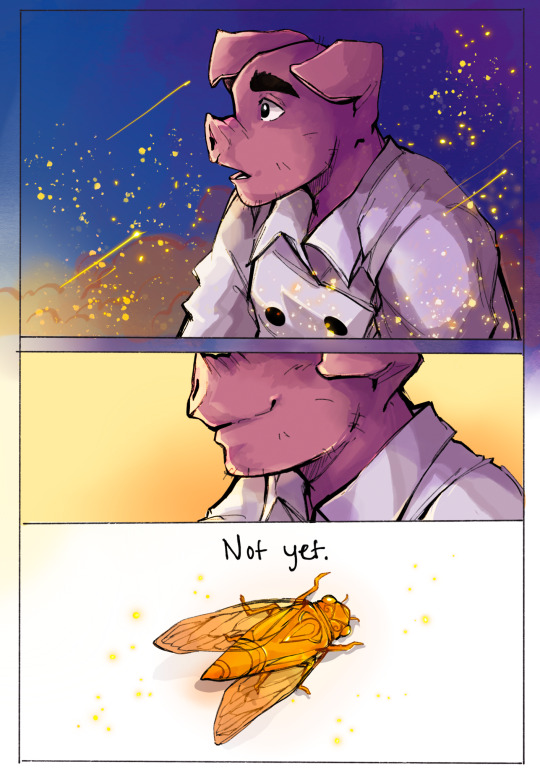
“This world may not be perfect, but its still worth fighting for”
(Finally finished the bigger thing from this post! :D tumblr also ate the quality fhdhdjjd so click for better quality!)
#lego monkie kid#lmk#lmk tang#lmk pigsy#tang x pigsy#freenoodleshipping#jam going ham#pretend that i didnt post the og like ten months ago dont look at me-#was this whole thing just an excuse to draw op tang and gay people? mayhaps#i love these two so much#and tang my beloved
951 notes
·
View notes
Note
How old do think each Batfam member is
( post crisis obviously)
wrt headcanoning ages i play it super fast and super loose with nothing but vibes so no essays in the replies plz. this is just the timeline that exists in my brain when im writing fic. with that in mind:
bruce (43)
babs (32)
dick (27)
cass (23)
jason (23)
steph (22)
tim (21)
duke (17)
damian (13)
like in an ideal world post-crisis canon would’ve progressed a few years — tim is now in his 20s (lol), damian is a teenager, and duke is an established character. i really like the hc that tim was dukes robin, so their ages reflect that. tim was emancipated at seventeen, when he stopped being robin. both steph and cass are older than tim. babs is at least five years older than dick because the retcon that they’re the same age makes my teeth itch. none of this “first true love” shit. they were friends as children and didn’t become romantically involved until their twenties. stop delegitimising all of babs and dicks other relationships!!!
idk how well it works time wise but i honestly don’t care too much about specifics? a pugnacious two year old timmy’s brain being permanently altered by the death of the graysons makes narrative sense to me. dick is fired as robin at seventeen (not a legal adult), which adds additional complexity to the situation with bruce. bruce is in his mid forties. that man has chronic back problems he is naht thirty six.
#legit had to go to my notes app to find the list i wrote like ten months ago lol#no one start explaining why the ages are wrong cause i do naht care ty#bruce wayne#dick grayson#barbara gordon#tim drake#batfam#dc comics#batman#the ask and the answer
213 notes
·
View notes
Text
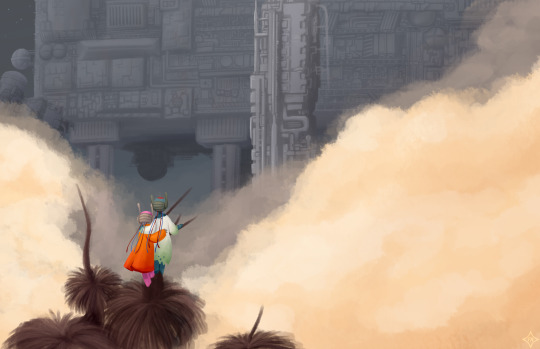

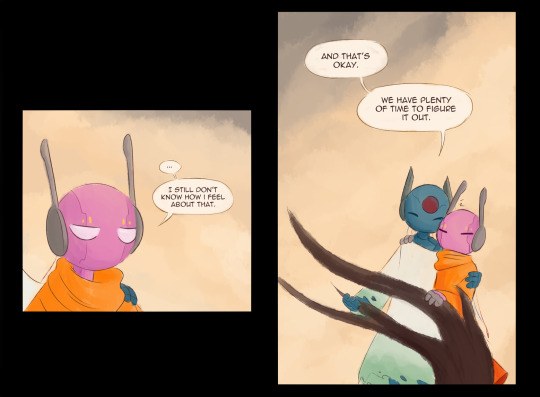
This shell may be missed in a way, but the fate it embodies will not.
(based off some spare screenshots of iterator shenanigans)
#hi i started this over two months ago#actually the comic portion has been done for AGES so it's a little old now#the rest took so long only because#I had to detail Pebbles' (former) shiny metal rectangular ass >:/#i just kept getting bored after doing it for like ten minutes at a time so it took forever#rain world#looks to the moon#five pebbles#art#flickerdoodles#iterator shenanigans#rw spoilers#dp spoilers
1K notes
·
View notes
Text
Okay so while rewatching season 7 I have suddenly gained a new respect for it lol
I love how despite being villains, Krux and Acronix still love each other and that Krux waited 40 years for his brother to return!
I also find it funny that Acronix travelled 40 years ahead in time, and from his point of view, his brother became old in a matter of seconds and nothing is the same anymore. But instead of being sad about it he loves the future! And technology!
The vermilion warriors are gross, lol. Ngl I felt sorry for Cyrus Borg in this scene:

If I were in his place I would literally die of shock. I would just ask Machia to kill me otherwise. Or maybe I would throw up.
But yeah! The time twins are cool and so is season 7!
#i remember answering an ask a few months ago in which i said s7 was my least favourite season from the first ten#its higher now#i think one reason i didnt like it was because it was the last season with the original designs and it made me sad#and the last time i had seen it was like late 2021 or early 2022#anyways#guplia rants#ninjago#ninjago hands of time#ninjago season 7#krux and acronix#machia ninjago#cyrus borg#ninjago acronix#acronix#ninjago krux
63 notes
·
View notes
Photo

And never let you go ♥
Bonus without the overspill lighting:

#💟#Digital art#Full Art#Art#Edgar#Scriabin#It's that time of year again where I get real sappy about Vargas ♥ Because yes! Once again it is my own personal Vargasversary! 🎊 Yaaaay#Seven years now - I don't know what to do with seven years it feels like a hard to define number haha#Right in the middle between five years and ten years! A while to be certain but hard to define as a Long Time either hmm#Well whatever it doesn't matter <3 The important part is that I still love Vargas and them very much ♥♪#I actually didn't really have any specific plans for this Vargasversary :0 I haven't been drawing them much again#Other things have drawn my focus and attention hehe ♪#So I just kinda set my hand loose - no sketches on paper no defined idea - this is just what my hand/brain came up with in the moment#I'm pleased :) I think it accurately expresses how I feel about them hehe <3#I wrote down what ended up being the text/caption a couple months ago while I was in Big Love in their direction#I don't remember what inspired it anymore other than just - They ♥ Themst ♥ Do love them <3#I've planned my next reread now ♪ Barring anything drastic (like an update lol) I know when I'll be rereading next#I'm looking forward to it! :D As always hehe <3#It's still a bit a ways off which works well for recharging :)#And of course I'll be doing my usual in the meanwhile - this and the main anniversary and my sketchdumps and Requestober haha#The caption is as much me as it is Edgar after all <3#Even quiet and sleeping I still find them as a comfort - a place I find rest and joy in ♥#Inspiring and lovely and wonderful - pretty and tender and dear!#Oh and#Always finding a way to flip up the bottom of the shirt#Hehe <3
134 notes
·
View notes
Text
btw guys boat boys have got me in their clutches again so perhaps expect a new fic
#YAYYYY!!!!!! WHO ELSE CHEERING !!!!!!!!!#bfop new update in the works also. for those of u that still care#this lovely person just went through a bunch of my ao3 works and left soooo many comments on each of them and it honestly made me so happy#like i fully started writing again for a fic that i last uploaded a chapter for ten months ago because of their comment#so u all have them to thank#yahooooo#jm so excited to get back on the writing grind !!! esp with winter break now#nya talks#trafficblr#hermitblr#boat boys#smalletho
47 notes
·
View notes
Text
I think we should just bring back Wungo Wednesday and start a fandom collective anime rewatch
#Because otherwise I can feel I won't last much longer#Because like. The last two hyperfixations of mine ended the moment I started feeling like there wasn't any new content#And two days ago in one day I started a new manga a new book and rewatching a favourite show#Whereas I hadn't started anything new in the two years ever since I got into bsd. Which makes it NOT a good sign#But the bsd anime has now ended for one month and 25 days and that's the last time the plot actually moved forward.#And if I counted right. The manga took 4 chapters (that is chapters 110-111) to adapt 6 minutes#That means it's going to take another 12 months (18 minutes left to adapt. that's 12 more chapters) to catch up with the anime#Yeah I'm not. sticking around this long with nothing new to see I'm sorry#Best case scenario I take a one year hiatus but that doesn't make it sound likely that I'll be back#And I know it's fresh news as early as this morning that author said they were introducing a new character but like.#They also said they finished writing this arc like. One year and half ago if I remember correctly?#And we still have yet to see the end of i t so...#That is to say. I'll probably be starting an anime rewatch starting next Wednesday. I've been meaning to do it for a while anyway#I don't want to leave the fandom I like the one chapter a month format#On the positive news I still have a queue of original posts that spans over ten months#And I was meaning to start the reblogs queue too in these days. So there's that#random rambles
152 notes
·
View notes
Text
doodles
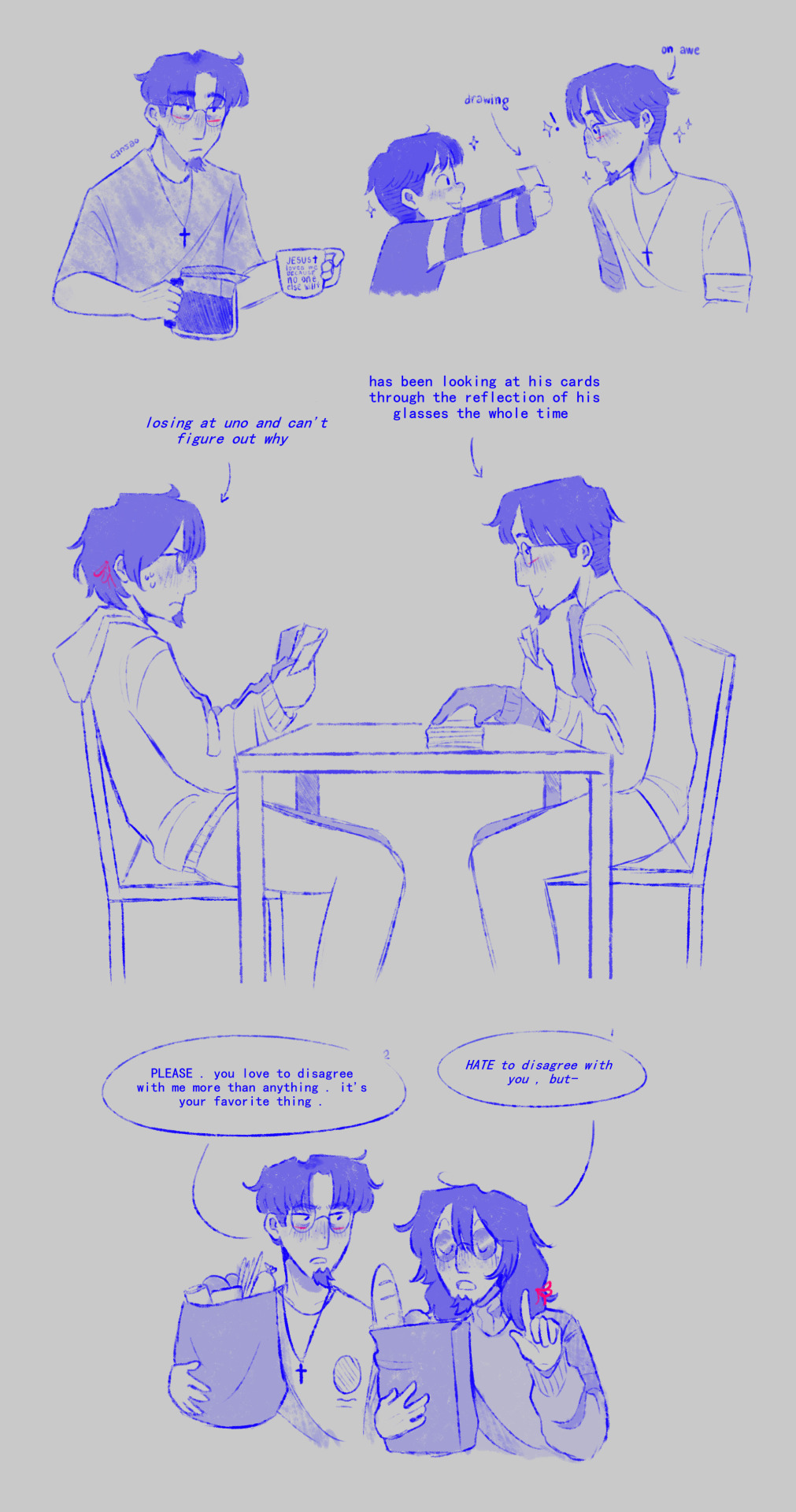


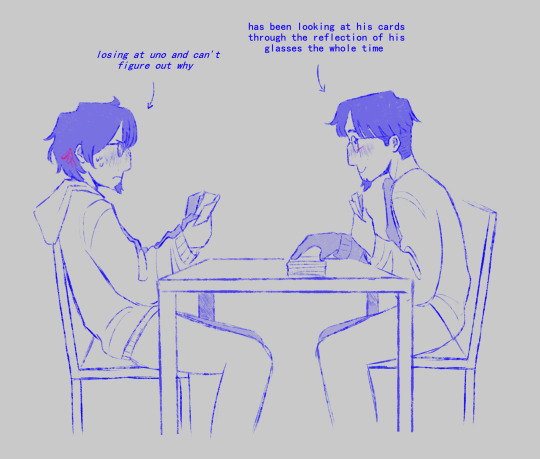
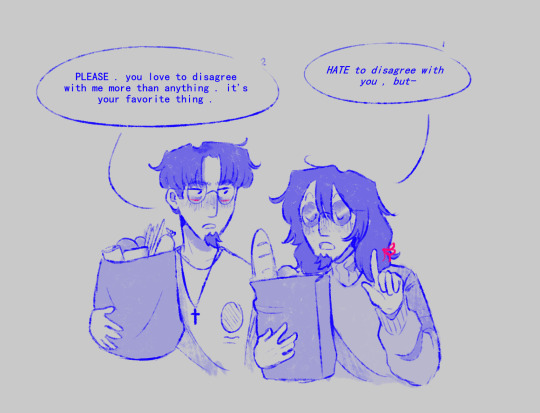
edgar vargas and squee by johnen vasquez
scriabin by zarla-s
#sunny's art#vargas#edgar vargas#vargas zarla#scriabin vargas#zarla s#scriabin#doodles#YOU THOUGHT YOU'D SEEN THE LAST OF ME . . . . !!!!#well HELLO !!!! I'M BACK !!!!!!!!#got a new brush . what do you think of it do you like it#okay i want to ramble about these wait a second#the first one looks a bit different to the rest because i was just trying new stuff .#if i spend a long time without drawing i'll forget how to draw and well it happened#i've changed my art style like 3 times now but i still draw side profiles the same . looks weird ugh#the mug says “ JESUS loves me BECAUSE no one else will ” btw . meta gave me the idea actually . thanks meta .#about the second one . finished that one like ten minutes ago . missed drawing todd aw#i just find their whole relationship so amusing .#like yes i went crazy for like a month and now i have a brother-husband and a kid ?!#they complement each other so well though . i love them#THE UNO ONE omg i've had that idea for like A YEAR NOW and i just drew it lol#i wonder how long it would take scriabin to notice though .#when i showed this to meta she said : “ oh wow !! edgar's finally winning at something !! ” and it's SO TRUE#wonder how he does it !#and the last one . i got the idea when i was looking through zarla's account searching for fan art .#love it so much though they look like their lives aren't a living hell#anyways i'll probably make more of these . who knows#going back to school on monday . and of course i had to get inspiration four days before going back .#please PLEASE I DON'T WANT TO GET BACK TO SCHOOL . PL#okay byeee enjoy these . eat my starved followers . EAT !!!!!
123 notes
·
View notes
Text
Hyacinthus: Some of you have been wondering how I tell Apollo and Achilles apart
Hyacinthus: I actually think it's quite simple, really
Hyacinthus: Achilles is the scourge of Sparta sent by the gods to sack our cities and murder our men.
Hyacinthus: and Apollo has gold-blue eyes and blond hair! Hope this helps.
#pursuing daybreak posting#I made this exact joke verbatim to my friends months ago#But considering how this day's gone#I felt like it was prudent to immortalise it here too#just as a treat#hyacinthus#achilles#Actually I forgot what makes this ten times funnier#In my story the Trojan Conflict never even happens#LMAO#shoutout to apocalyptical occurences that completely stop Fate
37 notes
·
View notes
Text

les problèmes viennent par deux
#WIP TIIIIME don't pay attention to the background that was from an ares edit a few days ago#but i saw these poses and i was like YOINK#GUYS I'm getting close to their scene AH there's this shot i want to attempt that i've had in my little brain for almost ten months now OOG#also when i post this i'm gonna make a separate post of these two together omg we're going back to 2017 AH#wip
52 notes
·
View notes